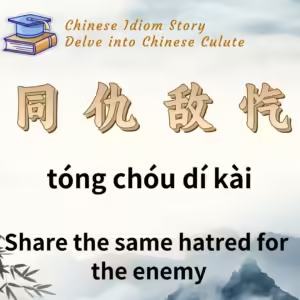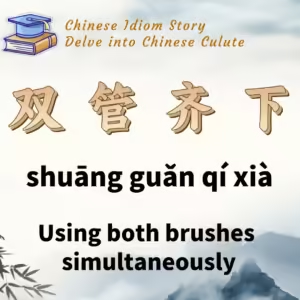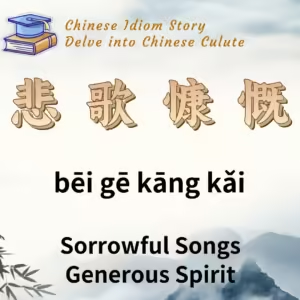
Chinese Idiom: 同仇敌忾 (Tong Chou Di Kai)
English Translation: Share the same hatred for the enemy
pīn yīn: tóng chóu dí kài
Idiom Meaning: This idiom describes a situation where people are united in their hatred of a common enemy and are determined to fight against them together.
Historical Source: 《诗经·秦风·无衣》 (Book of Songs, Qin Wind: No Clothes).
Idiom Story:
The poem 《无衣》 (“No Clothes”) is a stirring military song from the Spring and Autumn period of China, attributed to the Qin state. During the Western Zhou Dynasty, the Qin state was originally located in the region of the Qiang tribes (modern-day southeastern Xingping, Shaanxi). When King Ping of Zhou was escorted east to Luoyang by Duke Xiang of Qin, Qin was elevated to the status of a feudal lord and later moved its capital to Yong (modern-day Fengxiang, Shaanxi). This marked the beginning of Qin’s rise to power, eventually dominating central Shaanxi and southeastern Gansu.
The poem 《无衣》 is divided into three sections and consists of fifteen lines. The full text of the poem is:
岂曰无衣?与子同袍。
王于兴师,修我戈矛,与子同仇。
岂曰无衣?与子同泽。
王于兴师,修我矛戟,与子偕作。
岂曰无衣?与子同裳。
王于兴师,修我甲兵,与子偕行。
Translation:
“How can you say there are no clothes? I am willing to share a robe with you. The king is raising troops; we prepare our weapons and unite against our common foe. How can you say there are no clothes? I am willing to share an inner garment with you. The king is raising troops; we ready our spears and halberds to act together. How can you say there are no clothes? I am willing to share a war skirt with you. The king is raising troops; we prepare our armor and weapons to march together.”
The poem expresses solidarity and readiness among soldiers. It emphasizes that despite seeming lack of resources, they are united in their purpose and preparedness to fight for their common cause.
The phrase “与子同仇” (to share the same hatred for the enemy) reflects the deep sense of unity and mutual support among the soldiers. Over time, this concept evolved into the idiom “同仇敌忾”, which conveys the idea of people coming together in their hatred for a common enemy and working in unison against them.






